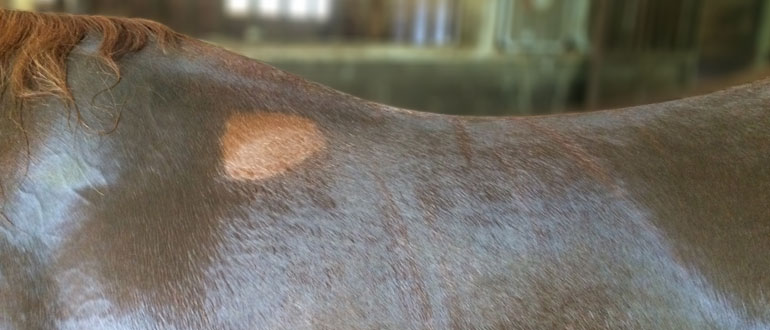There is a great deal of misunderstanding in the equine world in respect to dry spots and what they indicate. Not all dry spots are bad, but you have to understand the mitigating factors and learn to read what the dry spots are telling you.
Much has transpired over the years with changes in horse conformation and the traditional saddle trees. It used to be trees were only available in two or three types. The only consideration given was to width and very little to bar angle and bar twist. Then, as the purebred industry grew, saddle makers were often tree makers, and the good ones started to adjust the trees for the new types of horses that were being bred.
The whole focus was to change the trees so even pressure existed under all points of the tree bars to carry weight correctly. Today, this has progressed to the point where some of the good saddle makers have as many as 20 different kinds of combinations. However, most commercial companies generally only have 5-7.
When it comes to saddle fit, at 5 Star we generally feel there is no such thing as a “perfect fit” because the condition of the horse changes so much throughout the year. In the northern states and Canada, where winter becomes a “put the horse up and get fluffy on hay and grain,” this is especially true.
With all of the afore mentioned, the dry spot on the horse and pad is where the bulk of the pressure is being exerted from riding, fit, or both, or over-cinching.
What one really wants to see with a good pad that will wick moisture is a nice pattern of dryness demonstrating the shape of the entire bar(s) of the saddle! When one has been using pad material that has synthetic fiber or foam, wicking is limited and/or impossible, so dry spots normally will not show up. And if they do with synthetic material there is a terrible saddle fit issue because so much heat is being generated from a pressure point area that no moisture is being allowed to deposit. If this continues, permanent or semi-permanent damage to the area could occur.
Now if one does not have dryness that shows a complete bar pattern from a wicking material, and only isolated dry spots, one knows this is where the greatest amount of pressure exists. Size and location (normally on shoulder points) give clues as to whether the saddle tree is too wide, too narrow, poor twist, broken and/or a combination.
So, with wool pads, to begin with, one wants to see dryness. And if the dry spots (with reasonable pressure) do not seem to be making the horse sore after a ride, no harm is being done. However, if tenderness does exist the saddle is the first place one deals with in clearing up the issue.
Given the fact that saddles are expensive, and if they fit and the animal dies, the luxury of replacing them is not always possible–so one must be practical about padding. While I must point out that no matter how excellent the pad, it will never replace a well-fitting saddle, it can help alleviate some of the issues of a poorly fitting saddle (as evidenced by dry spots) in the short term.
In conclusion, while dry spots can be an indication of a poorly fitting saddle or a poor choice of padding material, with a good-quality pad made out of a wicking material such as wool, dry spots can be a sign that everything is working together as it should, if you know what to look for. Keep this in mind, check your horse regularly for soreness–and learn to read the dry spots.



